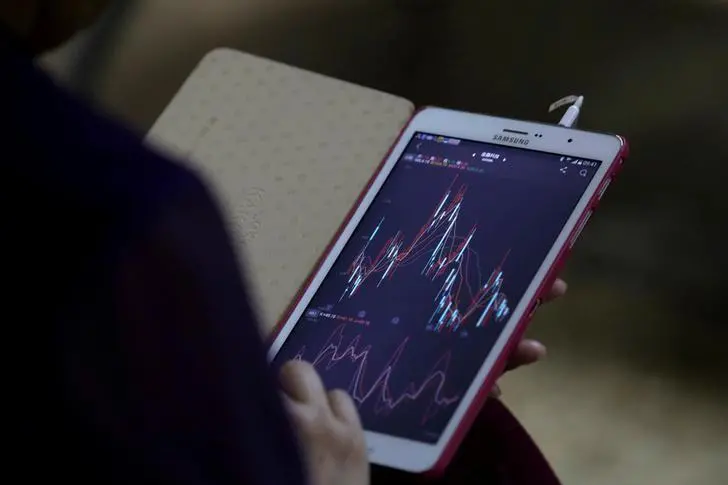PHOTO
SYDNEY - Asian shares took a breather on Tuesday after three straight sessions of gains, with markets consolidating in the hope an upswing in global growth could outlast a likely hike in U.S. borrowing costs this week.
The latest promising news came from China where banks doled out a surprisingly generous dose of credit in November, which could bode well for a pick up in retail sales and industrial output due later in the week.
MSCI's broadest index of Asia-Pacific shares outside Japan dithered either side of flat having bounced 2 percent in the past three sessions.
Moves were minor across the region, with blue chip Chinese shares off 0.2 percent and Australia up 0.1 percent . Japan's Nikkei was likewise steady, after the index scored its highest close in 25 years on Monday.
Wall Street had been led higher by technology and energy stocks, with Apple Inc making the biggest contribution. The Dow rose 0.23 percent, while the S&P 500 added 0.32 percent and the Nasdaq 0.51 percent.
There was no lasting market impact from an explosion in New York's busy Port Authority commuter hub which New York Mayor Bill de Blasio described as an "attempted terrorist attack."
Investors continued their policy vigil with the Federal Reserve set to end its two-day meeting on Wednesday, while the European Central Bank meets on Thursday.
JPMorgan Economist David Hensley suspects the Fed will revise up its growth forecast while trimming the outlook for the unemployment rate, potentially adding upside risk to the "dot plot" forecasts on interest rates.
"The dot plot previously called for three hikes in 2018; it is a close call whether this moves to four hikes," he warned, a shift that would likely boost the dollar but could bludgeon bonds.
"For its part, the European Central Bank (ECB)is likely to emphasize its low-for-long stance and continue to distance itself from the Fed," he added. "The staff is likely to revise up its 2018 growth forecast, while we think the core inflation forecast will reveal an even slower recovery than before."
RATES NOT EVERYTHING
The divergence in Fed and ECB policy was supposed to be bullish for the dollar, given it had widened the premium offered by U.S. two-year yields over German yields to 256 basis points from 188 basis points this time last year.
The last time the spread was that plump was in 1999.
Yet the euro is currently up 12 percent on the dollar this year, while the dollar is down 8 percent on a basket of currencies - an indication interest rate differentials aren't everything in forex.
On Tuesday, the euro was steady at $1.1768 having failed to clear resistance around $1.1812 overnight. The dollar was idling at 113.48 yen, just off a one-month top of 113.69.
Dealers at Citi noted interbank volumes in the forex market had been 35 percent below average overnight and another thin session was likely on Tuesday.
There was a little more action in bitcoin, which was last at $16,350 on the Bitstamp exchange while its newly minted futures contract fell back to $17,800.
In commodity markets, gold remained out of favour at $1,243.90 an ounce having suffered its biggest weekly drop since May last week.
Oil prices pushed ahead in the wake of news of a temporary shutdown of a pipeline that carries the biggest volume of the five North Sea crude oil streams.
Brent crude futures rose another 38 cents to $65.07 a barrel, after jumping $1.35 on Monday. U.S. crude futures added 26 cents to $58.25 a barrel.
(Reporting by Wayne Cole; Editing by Eric Meijer and Sam Holmes)
© Reuters News 2017




















